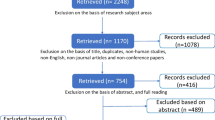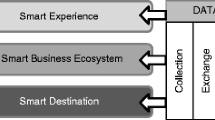Abstract
The role of urban form in influencing travel behaviour has gained particular interest to scholars and policy makers to achieve a broader goal of sustainability despite varied scholastic opinion on the effectiveness of this relationship. While transportation forms the nexus of any urban environment, it also accounts for about thirty-six per cent of the total energy consumption in the UK [Department of Energy and Climate Change, UK, 2013]. Thus, an emphasis to reduce greenhouse emissions in this sector remains a key policy objective to achieve sustainability. Also there is an overemphasis of research in this area on quantitative association between key variables as opposed to qualitative exploration in order to understand complex human behaviour. The study reported in this paper has been designed to address this gap. Using a grounded theory analysis, this paper reports findings from 6 focus group discussions and 17 in-depth interviews. Fifty-three participants were recruited from three case study areas across Northern Ireland to represent the urban continuum. Seven overarching categories have been identified explaining the interrelationships between urban form and travel behaviour in the Northern Ireland context. However, at a macro-scale, land-use policies have played a dominant role in shaping the travel patterns and this has translated in the form of car dependency and residential immobility over the years in Northern Ireland. Although current policy now adopts a more integrated approach to curb urban sprawl and achieve modal split, soft policy measures have proved useful in increasing the effectiveness of these policy interventions.


Similar content being viewed by others
References
Aditjandra PT (2013) The impact of urban development patterns on travel behaviour: lessons learned from a British metropolitan region using macro-analysis and micro-analysis in addressing the sustainability agenda. Res Transp Bus Manag 7:69–80
Aditjandra PT, Mulley C, Nelson JD (2009) Neighbourhood design impact on travel behavior: a comparison of US and UK experience. Projections 9:28–56
Aditjandra PT, Cao X, Mulley C (2012) Understanding neighbourhood design impact on travel behaviour: an application of structural equations model to a British metropolitan data. Transp Res Part A: Policy Pract 46(1):22–32
Aditjandra PT, Mulley C, Nelson JD (2013) The influence of neighbourhood design on travel behaviour: empirical evidence from North East England. Transp Policy 26:54–65
Alam JB, Wadud Z, Alam JB, Polak JW (2013) Energy demand and economic consequences of transport policy. Int J Environ Sci Technol 10:1075–1082
Allan G (2003) A critique of using grounded theory as a research method. Electron J Bus Res Methods 2(1):1–10
Antipova A, Wang F, Wilmot C (2011) Urban land uses, socio-demographic attributes and commuting: a multilevel modeling approach. Appl Geogr 31(3):1010–1018
Bains G, Ridley A, Carrarini A, Craig S (2011) Car dependency scorecard 2011: the top European cities for sustainable transport. Campaign for Better Transport, London
Banister D (1996) Energy, quality of life and the environment: the role of transport. Transp Rev 16(1):23–35
Banister D (2007) Land use, planning and infrastructure issues in transport, commissioned paper for the shadow committee on climate change. Transport Studies Unit, Oxford
Banister D (2008) The sustainable mobility paradigm. Transp Policy 15(2):73–80
Boal FW (1996) Integration and division: sharing and segregating in Belfast. Plan Pract Res 11(2):151–158
Bohte W, Maat K, van Wee B (2009) Measuring attitudes in research on residential self-selection and travel behaviour: a review of theories and empirical research. Transp Rev 29(3):325–357
Cao X, Mokhtarian PL, Handy SL (2009) Examining the impacts of residential self-selection on travel behaviour; a focus on empirical findings. Transp Rev 29(3):359–395
Clifton KJ, Handy S (2003) Qualitative methods in travel behaviour research. In: Jones D, Stopher P (eds) Transport survey quality and innovation. Elsevier, Oxford, pp 283–302
Cooper J, Ryley T, Smyth A (2001) Contemporary lifestyles and the implications for sustainable development policy: lessons from the UK’s most car dependent city, Belfast. Cities 18(2):103–113
Crane R, Crepeau R (1998) Does neighborhood design influence travel? A behavioral analysis of travel diary and GIS data. Transp Res Part D Transp Environ 3(4):225–238
Department for Regional Development (2010) Regional development strategy 2035: building a better future. DRDNI, Belfast
Department of Energy and Climate Change (2013) Energy consumption in the UK (2013). Department of Energy and Climate Change, UK
Dey I (2004) Grounded theory. In: Seale C, Gobo G, Gubrium JF, Silverman D (eds) Qualitative research practice. Sage, London, pp 80–94
Dur F, Yigitcanlar Y (2014) Assessing land-use and transport integration via a spatial composite indexing model. Int J Environ Sci Technol. doi:10.1007/s13762-013-0476-9
Gardner B, Abraham C (2007) What drives car use? A grounded theory analysis of commuters’ reasons for driving. Transp Res Part F Traffic Psychol Behav 10(3):187–200
Glaser BG (1992) Basics of grounded theory analysis. Sociology Press, Mill Valley
Gordon I (2008) Density and the built environment. Energy Policy 36(12):4652–4656
Handy S (1996) Methodologies for exploring the link between urban form and travel behavior. Transp Res Part D Transp Environ 1(2):151–165
Headicar P (2003) The contribution of land use planning to reducing traffic growth: the English experience. EJTIR 3(2):137–154
Hickman R, Banister D (2007) Transport and reduced energy consumption: what role can urban planning play? Working paper no. 1026 edn, University of Oxford
Kitamura R, Mokhtarian PL, Laidet L (1997) A micro-analysis of land use and travel in five neighborhoods in the San Francisco Bay Area. Transportation 24:125–158
Leck E (2006) The impact of urban form on travel behavior: a meta analysis. Berkeley Plan J 19:37–58
Maat K, van Wee B, Stead D (2005) Land use and travel behaviour: expected effects from the perspective of utility theory and activity-based theories. Environ Plan 32(1):33–46
McEldowney M, Scott M, Smyth A (2003) Integrating land-use planning and transportation-policy formulation in the Belfast Metropolitan area. Irish Geogr 36(2):112–126
McEldowney M, Ryley T, Scott M, Smyth A (2005) Urban Form and reducing the demand for car travel: towards an integrated policy agenda for the Belfast Metropolitan Area? In: Renewing urban communities Ashgate, Aldershot, Hampshire, England, pp 75–93
Naess P (2003) Urban structures and travel behaviour. Experiences from empirical research in Norway and Denmark. EJTIR 3(2):155–178
Naess P (2011) ‘New urbanism’ or metropolitan-level centralization? A comparison of the influences of metropolitan-level and neighborhood-level urban form characteristics on travel behavior. J Transp Land Use 4(1):25–44
NINIS (2011) Northern Ireland level information. NISRA, NI
Schwanen T, Dieleman FM, Dijst M (2001) Travel behaviour in Dutch monocentric and policentric urban systems. J Transp Geogr 9(3):173–186
Shuttleworth I, Power J, McKinstry D (2000) Examining 1991 travel-to-work patterns in the Belfast Urban Area as a context for urban employment policy. Appl Geogr 20(2):177–202
Simma A, Axhausen KW (2003) Interaction between travel behaviour, accessibility and personal characteristics: the case of upper Austria. EJTIR 3(2):179–197
Snellen D, Borgers A, Timmermans H (2002) Urban form, road network type, and mode choice for frequently conducted activities: a multilevel analysis using quasi-experimental design data. Environ Plan A 34(7):1207–1220
Stead D (2001) Relationships between land use, socioeconomic factors, and travel patterns in Britain. Environ Plan 28(4):499–528
Strategic Investment Board NI (2012) Investment Strategy for Northern Ireland 2011–2021. Northern Ireland Executive, Belfast
Strauss A, Corbin J (1998) Basics of qualitative research: techniques and procedures for developing grounded theory, 2nd edn. Sage Publications, Thousand Oaks
Susilo YO, Maat K (2007) The influence of built environment to the trends in commuting journeys in the Netherlands. Transportation 34(5):589–609
Susilo YO, Williams K, Lindsay M, Dair C (2012) The influence of individuals’ environmental attitudes and urban design features on their travel patterns in sustainable neighborhoods in the UK. Transp Res Part D Transp Environ 17(3):190–200
The Planning Service November 2004, Belfast Metropolitan Area Plan Draft Plan, The Department of the Environment (DOE), NI
Timmermans H, van der Waerden P, Alves M, Polak J, Ellis S, Harvey AS, Kurose S, Zandee R (2003) Spatial context and the complexity of daily travel patterns: an international comparison. J Transp Geogr 11(1):37–46
van de Kaa EJ (2010) Prospect theory and choice behaviour strategies: review and synthesis of concepts from social and transport sciences. EJTIR 10(4):299–329
Walker D, Myrick F (2006) Grounded theory: an exploration of process and procedure. Qual Health Res 16(4):547–559
World Commission on Environment and Development (1987) Our common future. Oxford University Press, Oxford
Yigitcanlar Y, Teriman S (2014) Rethinking sustainable urban development: towards an integrated planning and development process. Int J Environ Sci Technol. doi:10.1007/s13762-013-0491-x
Acknowledgments
The findings presented in this paper forms part of a doctoral research sponsored by the University of Ulster, Jordanstown, UK. The authors would like to thank all the participants and experts for their invaluable time and comments to further strengthen the dialogue between land use and transport in the Northern Ireland context. And finally the authors would like to thank the two anonymous reviewers for their invaluable comments.
Author information
Authors and Affiliations
Corresponding author
Rights and permissions
About this article
Cite this article
Banerjee, U., Hine, J. Identifying the underlying constructs linking urban form and travel behaviour using a grounded theory approach. Int. J. Environ. Sci. Technol. 11, 2217–2232 (2014). https://doi.org/10.1007/s13762-014-0585-0
Received:
Revised:
Accepted:
Published:
Issue Date:
DOI: https://doi.org/10.1007/s13762-014-0585-0




